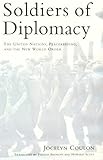Soldiers of Diplomacy : The United Nations, Peacekeeping, and the New World Order / Jocelyn Coulon.
Material type: TextPublisher: Toronto : University of Toronto Press, [1999]Copyright date: ©1998Description: 1 online resource (272 p.)Content type:
TextPublisher: Toronto : University of Toronto Press, [1999]Copyright date: ©1998Description: 1 online resource (272 p.)Content type: - 9780802008992
- 9781442680081
- 341.5/23
- JZ6374
- online - DeGruyter
| Item type | Current library | Call number | URL | Status | Notes | Barcode | |
|---|---|---|---|---|---|---|---|
 eBook
eBook
|
Biblioteca "Angelicum" Pont. Univ. S.Tommaso d'Aquino Nuvola online | online - DeGruyter (Browse shelf(Opens below)) | Online access | Not for loan (Accesso limitato) | Accesso per gli utenti autorizzati / Access for authorized users | (dgr)9781442680081 |
Browsing Biblioteca "Angelicum" Pont. Univ. S.Tommaso d'Aquino shelves, Shelving location: Nuvola online Close shelf browser (Hides shelf browser)

|

|

|

|

|

|

|
||
| online - DeGruyter Sociology and the Sacred : An Introduction to Philip Rieff's Theory of Culture / | online - DeGruyter Sojourners and Settlers : The Macedonian Community in Toronto to 1940 / | online - DeGruyter Sojourning Sisters : The Lives and Letters of Jessie and Annie McQueen / | online - DeGruyter Soldiers of Diplomacy : The United Nations, Peacekeeping, and the New World Order / | online - DeGruyter Sons of the Empire : The Frontier and the Boy Scout Movement, 1890-1918 / | online - DeGruyter The Spenser Encyclopedia / | online - DeGruyter Spenser's Supreme Fiction : Platonic Natural History and The Faerie Queene / |
restricted access online access with authorization star
http://purl.org/coar/access_right/c_16ec
United Nations peacekeeping troops, or 'Blue Helmets,' were first deployed in 1956 to oversee the withdrawal of French, British, and Israeli forces from the Suez Canal. Canadian Lester B. Pearson was awarded the Nobel Peace Prize the following year for proposing this solution to the Suez crisis. Now forty years later, United Nations peacekeepers play a very different role from that of Pearson's lightly armed 'soldier-diplomats.' In June 1997, there were only seven UN missions in which the Blue Helmets were acting as true peacekeepers; another ten missions placed the Blue Helmets in civil conflicts where their roles ranged from evacuating threatened groups to organizing elections, and their tasks were much more dangerous.Jocelyn Coulon draws his experiences visiting nine peacekeeping missions, including Cambodia, Bosnia, and Somalia, at a pivotal point in UN history, when the UN troops were increasingly acting as warriors of a new world order. He raises important questions: How can the UN distinguish its objectives from the interests of the great powers? Could - and should - the UN maintain an independent army? How can the pitfalls encountered by the peacekeepers in Somalia and Bosnia be avoided? Finally, Coulon urges a return to the original, though less spectacular, role of the UN soldiers: keeping the peace where peace is really the goal of the parties involved.Soldiers of Diplomacy was first published in French in 1994; this new English edition has been updated to reflect recent events. The result of interviews with dozens of soldiers, officers, and officials involved in peacekeeping activities, it is a unique and thought-provoking investigation of UN peacekeeping.
Mode of access: Internet via World Wide Web.
In English.
Description based on online resource; title from PDF title page (publisher's Web site, viewed 01. Nov 2023)


